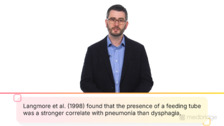Functional Swallowing Part 1: What It Means and Why It Matters
Presented by Tim Stockdale
12-Month Subscription
Unlimited access to:
- Thousands of CE Courses
- Patient Education
- Home Exercise Program
- And more
This course emphasizes the critical need for healthcare professionals to adopt a functional approach to dysphagia management, moving beyond isolated observations like aspiration to focus on broader health outcomes such as nutrition, pulmonary health, and patient safety. It examines the variability in dysphagia training and its impact on clinical decision-making, highlighting the consequences of interventions with limited evidence, such as thickened liquids and NPO recommendations. The course introduces the concept of functional swallowing, prioritizing outcomes like adequate nutrition and reduced pulmonary risks while aligning with evidence-based practices and ethical principles, including “first, do no harm.” Participants will explore the importance of critical thinking and the limitations of overreliance on intuition or tradition. By incorporating reasoning frameworks and evidence-supported strategies, clinicians will learn to assess and address the root causes of swallowing dysfunctions while improving patient outcomes. Designed for clinicians who work with dysphagia, this course helps participants to make informed, patient-centered decisions that reflect the complexity of dysphagia management in diverse clinical settings. Let this course inspire a shift toward interventions that maximize function and minimize harm while supporting the patient’s health and safety.
Learning Objectives
- Analyze current dysphagia management practices, identifying unintended consequences and ethical considerations of dysphagia management
- Examine the reliance on intuition and tradition in clinical decision-making through data from relevant studies
- Compare the traditional focus on aspiration and residue (what we see) with the concept of functional swallowing (why it matters), emphasizing the four anchors: nutrition, hydration, quality of life, and pulmonary function
- Analyze deductive arguments related to dysphagia interventions to determine their soundness
- Apply principles of inductive and deductive reasoning to clinical scenarios in dysphagia management to enhance decision-making skills
- Identify how dysphagia can lead to issues with nutrition, hydration, and quality of life
Meet your instructor

Tim Stockdale
Timothy (Tim) Stockdale has served as a speech-language pathologist primarily in university and acute care settings. He has taught at the graduate level for several years, focusing on adult dysphagia and acquired communication disorders. He is particularly passionate about addressing gaps in dysphagia education and practice.…
Chapters & learning objectives

1. The Burning Platform: Why Functional Swallowing Matters
Chapter 1 introduces the “burning platform” concept, highlighting the urgency of reevaluating dysphagia training and management. It critiques the variability in clinical preparation, the overuse of interventions with limited evidence, and the ethical guideline to “do no harm.” This chapter lays the groundwork for adopting functional, evidence-based approaches to dysphagia care.

2. Lessons From a Case Scenario
Chapter 2 presents a case scenario to explore the significance of functional swallowing outcomes. It emphasizes the importance of moving beyond form-based observations, such as residue or aspiration, to assess their potential impact on nutrition, pulmonary health, and overall function.

3. Reframing Our Focus
Chapter 3 redefines dysphagia management by distinguishing between swallowing safety and efficiency. It underscores the need to prioritize functional outcomes, examining how inefficiencies and airway compromise may impact health. By shifting focus to these broader consequences, clinicians can implement strategies to optimize nutrition, pulmonary function, and quality of care.

4. Applying Critical Thinking to Clinical Decision-Making
Chapter 4 introduces deductive and inductive reasoning frameworks to enhance clinical problem-solving in dysphagia management. It highlights the importance of evaluating evidence, considering modifiable variables, and respecting patient autonomy. Clinicians will learn to make more informed, ethical decisions that balance safety, effectiveness, and patient-centered care.


